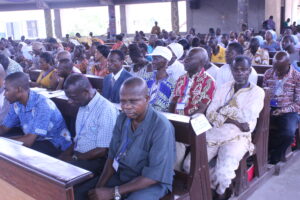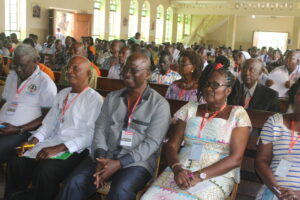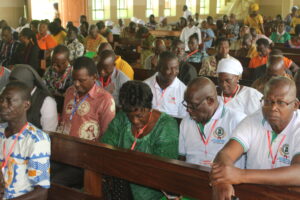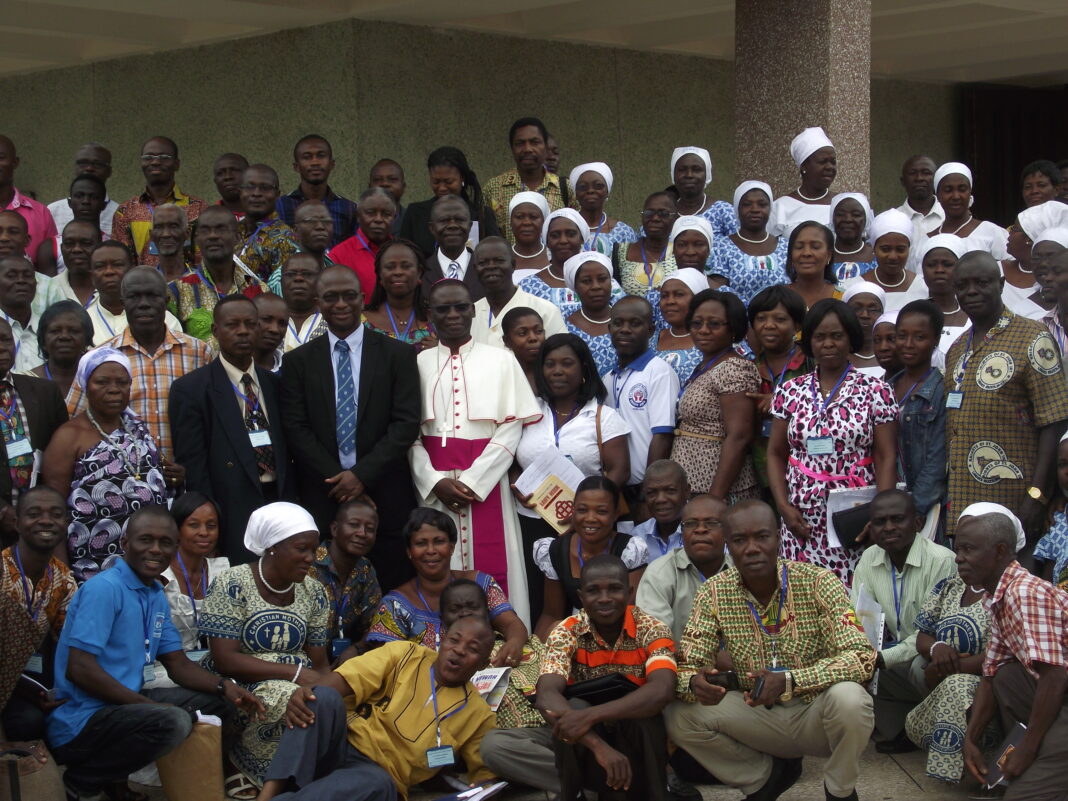Two bizarre scenarios
Imagine this scenario: a group of devout and enthusiastic Catholics are waiting for mass to begin on a Sunday morning. After a 15- minute wait, the catechist stands up and makes a terse announcement. “Fellow parishioners, the parish priest is celebrating a private mass at the parish house. He is therefore not available for mass Thank you all for coming!”
There is another scenario a week later
The parish priest comes to Church, one fine Sunday, ready to celebrate mass only to find that the Church is completely empty. The same catechist is present to offer an explanation: “Father, the Parishioners prefer to celebrate mass today without the priests… they like it this way!”
These two scenarios may look extreme and even ridiculous, but it demonstrates what can happen when the place of the laity in the Church on one hand and the clergy on the other is confused and misunderstood.
Many Catholics believe wrongly that the recognized vocation in the Church is the ordained one and only priests, brothers and the religious are called to serve God in the Church. Some Catholics are even convinced that the laity is simply to help out in the Parish and not really called to play any meaningful role in the integral part in the mission of the Church.
Mission and vocation of the laity
But does the laity really have a mission in its own right and what is its role in the context of the New Evangelization? What is New Evangelization in the first place, one may ask? It is a new expression which has found its way into the current Catholic lexicon. Croatian Archbishop Nicola Esterovic has explained that New Evangelization means reaching out to baptized Catholics who have become distant from the faith. In other words, New Evangelization aims to reach out to alienated Catholics, who in many cases, have become secularized or backslidden.

What about the word ‘lay’? It is derived from the Greek word ‘laikos’ meaning ‘of the people’. The Church therefore defines the laity or lay faithful as people within the Church, including brothers and sisters as well as all other single and married persons, who are not ordained as bishop, priest or deacon.
Pope John Paul II (now Saint John Paul II) set the tone for the mission of the laity when he addressed the World Congress of Ecclesial Movement and New Community in May 30th 1998. He said among other things: “There is so much need today for mature Christian personalities, conscious of their baptismal identity, of their vocation and mission in the Church and in the world.” The theology is not difficult to explain. He is simply saying that the Church needs active and committed lay people.
In short, the lay vocation is an important position in the hierarchy of the Church. It would be a big mistake to think that only those called to religious or clerical life have a vocation. Vocation simply means a call. It is God’s invitation. His call to each person to love and serve Him and His Church in a particular state or way of life. Each person’s vocation flows from the grace of Baptism.
‘When the worship ends, the service begins.’
The Church teaches that lay people are equal to those in ordained and religious life. The only difference is that each group has a defined role to play. On the mission field, the work of the laity is the crucial means by which the world encounters Christ and in the process addresses the problems and concerns of the world with the divine message of salvation.
That is why at the end of the Mass, the priest says, “Go in peace to love and serve the Lord” By stating the dismissal in this way, the priest is commissioning us to leave the place of worship and to go back to the world outside and to live our Christian lives there, in service to our Lord. At the end of Matthew’s gospel, Jesus did exactly the same thing with his disciples. He gave them the great commission to go out and baptize people of all nations in the name of the Father, Son and Holy Spirit.

Therefore, this dismissal is our commission to go into the world to serve God and each other through love. ‘When the worship ends, the service begins.’ In other words, when we leave, dismissed by the priest, the service of God and of each other begins
The fact of the matter is that our vocation and mission as lay people derive from our baptism and is strengthened through confirmation. The place and work of lay people in the body of Christ is given directly by the Holy Spirit. Ephesians 1: 22-23,“And he has put all things under his feet and has made him the head over all things in the Church, which is his body, the fullness of him who fills all in all,” describes how priests and laity unite and work together to form the Mystical Body of Christ.
The bishops and priests have a prominent and God-given place in the body of Christ. Ephesians 4: 11-14 explains it all.
The task of the clergy
“The gifts he gave were that some would be apostles, some prophets, some evangelists, some pastors and teachers, to equip the Saints for the work of ministry, for building up the body of Christ, until all of us come to the unity of the Faith of the knowledge of the Son of God, to maturity, to the measure of the full stature of Christ.”
The task of the clergy is to teach, sanctify and govern so that the laity can do the work of evangelizing and renewing the rest of the world beyond the altar.
Vatican II Council Dogmatic Constitution, Lumen Gentium Number 10, throws more light on this shared task. “Though they differ essentially and not only in degree, they are nonetheless ordered to one another, since each in its proper way shares in the one priesthood in Christ.”
In my parish, for example there is a particular lady who makes time to teach catechism classes with incredible love and commitment. Her greatest joy is to see young boys and girls receive First Holy Communion and Confirmation. She would comb through books on Saints just to find the most suitable stories to encourage the children.
This kind of gift is another dimension of the great gift of teaching. The work of priests in our Churches will be greatly hampered without the support of catechists, interpreters, choristers, ushers, readers, Mass servers, communion ministers and many other Church workers.
The list of workers who also helped Paul in his missionary work is truly long. Romans 16: 21-23 comes up with many unfamiliar names: “Timothy, my co-worker, greets you: so do Lucius, Jason, Sosipater, my relatives. Tertius, the writer of this letter… Gaius, who is host to me and to the whole Church, greets you. Erastus, the city treasurer, and our brother Quartus, greet you”
Small Christian Communities
At the Second National Pastoral Congress held in Sunyani from the 5th to the 11th of August 2014, 270 delegates drawn from all arch/dioceses of Ghana called for emphasis to be put on the establishment of Small Christian Communities in order to bring the Church to the doorsteps of the faithful.
Small Christian Communities are vibrant in many parishes in the Accra Archdiocese. The gifts of lay Christians are brought to the fore during such gatherings. In Community Eight of Queen of Peace Parish, Madina, members make it a point to search and find dormant Catholics within the confines of their Community and bring them back to Church. Every Sunday evening, members meet in the home of a member (this is done on rotational basis) and the Gospel of the following Sunday is shared in Ewe, Akan and English.
The activities of Small Christian Communities such as these have proved to be very crucial in bringing the divine message of Salvation to ordinary people in a new and exciting way. For most part, the apostolate of the priests cannot be fully effective without the support of the laity.

Some categories of work might be better done effectively by lay people than by priests or the religious. Lay people who are experienced and qualified accountants may be more useful to the parish than priests who are merely appointed to the position without basic training in book-keeping. Lay people rather than priests may be better equipped to confront certain economic, political and social realities in the world. It is equally true to say certain religious congregations in Nigeria, for example, also have their members who are bankers and a host of other unlikely professionals.
The example of the seven young men chosen to serve as recorded in the Acts 6: 1-6 is a case in point. “Now during those days, when the disciples were increasing in number, the Hellenists complained against the Hebrews because their widows were being neglected in the daily distribution of food. And the twelve called together the whole community of the disciples and said, “It is not right that we should neglect the word of God in order to wait at tables. Therefore friends, select from among yourselves seven men of good standing, full of the spirit and of wisdom whom we may appoint to this task, while we for our part will devote ourselves to prayers and to serving the word. What they said pleased the whole community and they chose Stephen, a man full of faith and the Holy Spirit, together with Philip, Prochorus, Nicanor, Timon, Parmenas and Nicholaus, a proselyte of Antioch. They had these men stand before the apostles who prayed and laid their hands on them.
The word of God continued to spread the number of the disciples increased greatly in Jerusalem and a great many of the Priests became obedient to the faith.”
Lay believers may be better placed to permeate the economic, social and political realities of the world armed with the demands of Christian doctrine. It is through the body of Christ that Jesus does his work in the world and that work is not done only by priests, bishops and popes but most often by the laity who make up roughly 98% of the Body of Christ.
Participating in the life of the Church
Cardinal James Francis Stafford, then President of the Pontifical Council for the Laity, remarked in 2003 that, “the most significant positive development since Second Vatican Council has been the flourishing of lay movements within the Church.” Some examples of contemporary ecclesial movements include Catholic Charismatic Renewal, Focolare, Cursillo, Marriage Encounter etc.
We are all called to spread the Gospel through both word and deeds to friends, family, coworkers, neighbours and even strangers that we meet in our daily lives. It makes the famous American author and conference speaker John MacArthur’s remark so relevant today: He once said: “You are the only Bible some unbelievers will ever read.”
“A holy life will produce the deepest impression”
There is a growing trend among many lay people in Ghana today which is quite disturbing. Lay people, who are also parents, are increasingly making demands on their children, priests, brothers and sisters to provide them with the good things of life. Holiness will be compromised when the clergy feel obliged to comply with the demands of siblings and parents. Won’t it be a good thing to have happy, holy and fulfilled clergy in our midst? D.L. Moody the famous preacher once said, “A holy life will produce the deepest impression. Lighthouses blow no horns, they only shine.”
Praying for our spiritual leaders
A Church that prays for its leaders will exhibit spiritual strength. But how does God respond when we pray for our leaders? In Acts 12, we have a vivid example of what happens when we pray for our leaders. Acts 12:5 says…while Peter was kept in prison, the Church prayed fervently to God for him…The account which follows is a heart-warming testimony of what happens when we pray for our pastors and spiritual heads. Please take time and read the whole chapter. Prayer indeed moves the hand that moves the world.
May the Holy Spirit move the laity to rediscover their proper role in the Body of Christ and may they use their myriad gifts to support the clergy to win many souls for the Kingdom of God.
Let me conclude this article with the uplifting words taken from Catholic Hymn 6
We come with this petition
That you will guide and shield
Your labourers who are toiling
Upon the harvest field.
We come to you entreating
Since you have died for all
That soon your scattered children
May gather at your call.
Editorial Note: This piece was written by Dan Dzide, former Executive Secretary, Department of Social Communications, National Catholic Secretariat, Accra. It was first published on the website of the Ghana Catholic Bishops’ Conference (cbcgha.org) in 2015. This article is still relevant for the Laity in Ghana.



